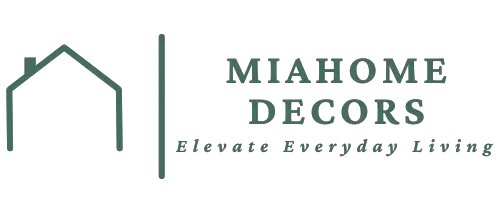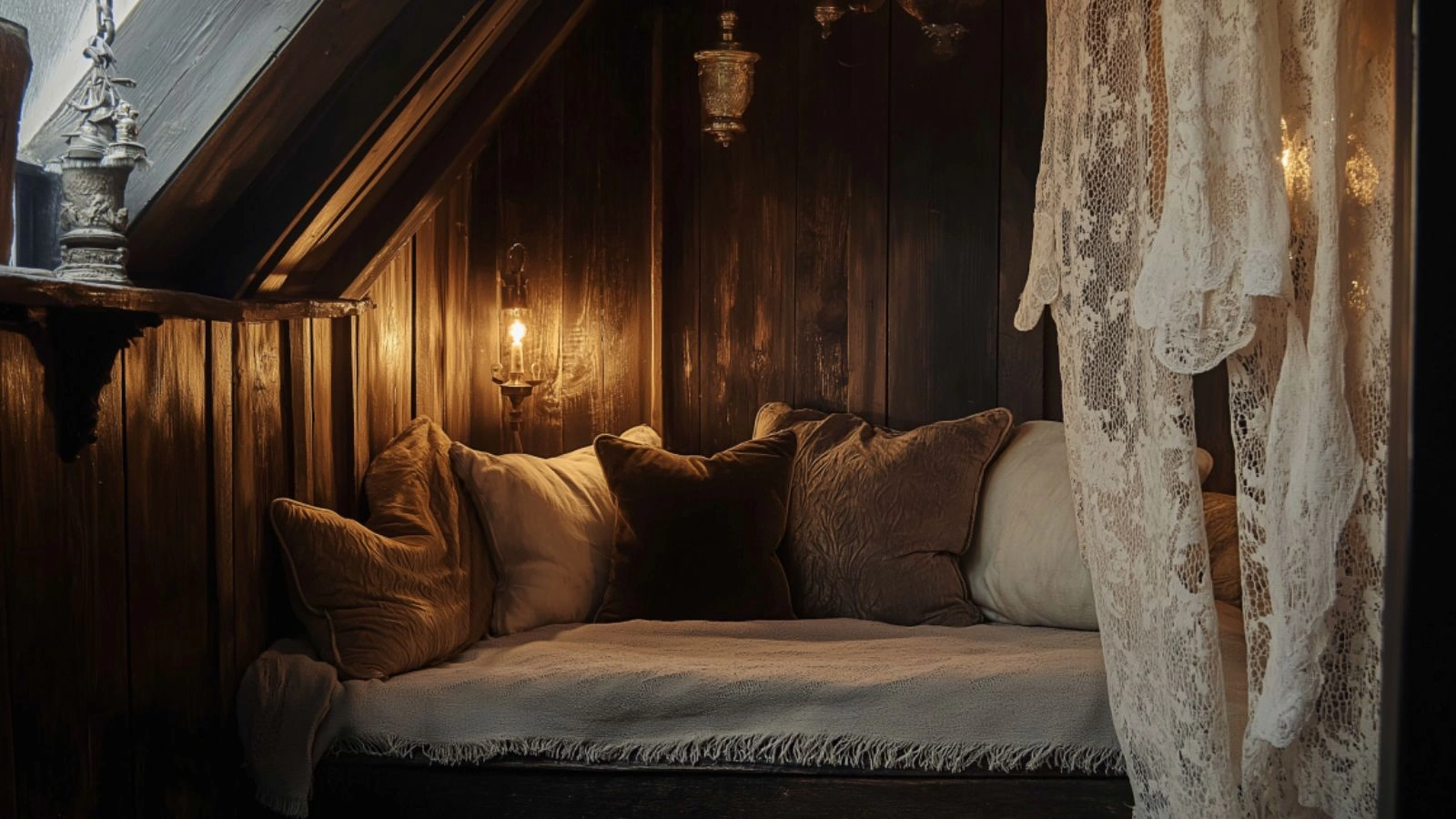Layering Textures in Dark Cottagecore Decor: How to Create a Rich and Romantic Interior Look
Table of Contents
In a world of fast trends and sterile minimalism, dark cottagecore emerges as a soulful alternative. It’s lush, moody, and deeply personal. But what makes a dark cottagecore interior feel truly rich? The answer lies in texture.
Think of walking into a room draped in velvet, lined with antique lace, and grounded by timeworn wood floors. You don’t just see beauty—you feel it. That feeling is the result of thoughtful layering. In this romantic aesthetic, textures do more than just decorate—they tell a story.
This blog post dives deep into how to layer textures in dark cottagecore decor to achieve that coveted richness and depth. You’ll discover which materials to combine, how to style with contrast, and ways to bring this cozy, dramatic look into your own home. Whether you’re decorating a reading nook or designing a full-room retreat, these ideas will help you evoke warmth, nostalgia, and comfort through texture.
Why Texture is the Heart of Dark Cottagecore Style
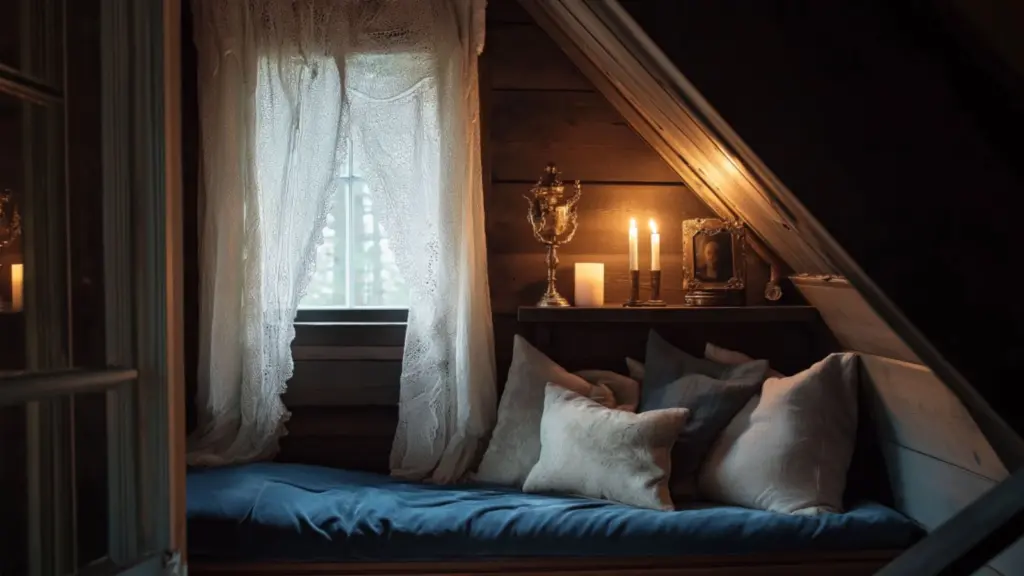
Texture plays a starring role in any well-designed space, but it’s absolutely essential in dark cottagecore. This moody aesthetic depends on layers of tactile richness to balance its shadowy palette.
Dark cottagecore is more than just painting walls deep green or charcoal. It’s about creating a sensorial experience where every object, fabric, and finish feels curated and nostalgic. Texture helps soften the darker elements, keeping the look inviting instead of gloomy.
To achieve this, think in layers: mix soft with rough, matte with glossy, heavy with delicate. Pair a velvet armchair with a crocheted throw. Place weathered wood next to polished brass. Contrast adds depth, while repetition creates flow.
Textural Pairings to Try in Dark Cottagecore
| Primary Texture | Complementary Pairing | Why It Works |
|---|---|---|
| Velvet | Wrought iron or lace | Soft and bold juxtaposition |
| Raw wood | Vintage ceramics | Rustic meets refined |
| Linen or muslin | Embroidered details | Natural base with ornate overlay |
| Aged leather | Wool or sheepskin | Sleek with plush warmth |
| Dark florals | Rattan or cane | Romantic softness meets structure |
Mixing Natural and Antique Materials for Timeless Warmth
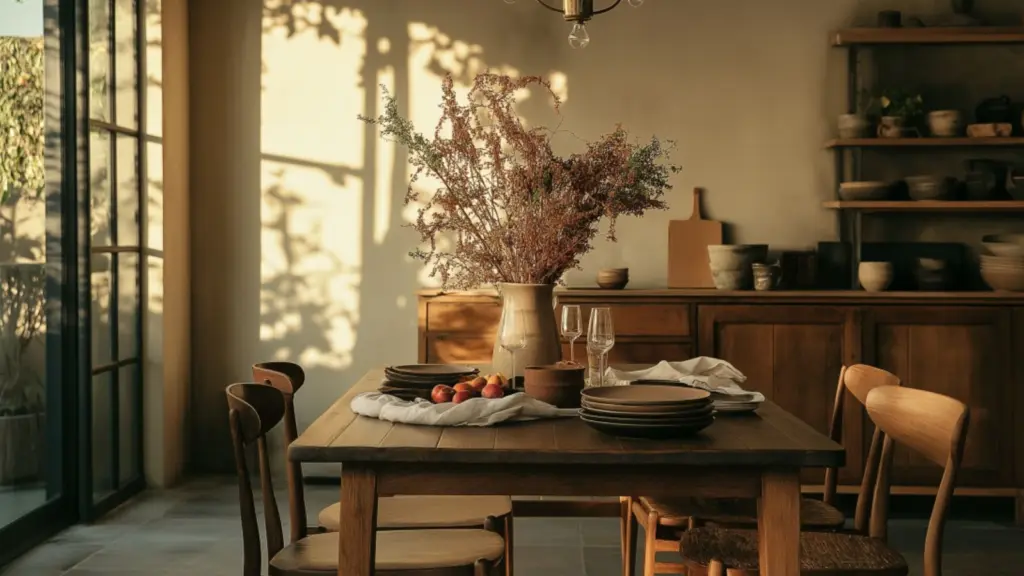
In dark cottagecore decor, there’s a reverence for materials that feel grounded in nature or history. Natural textures—like wood, wool, stone—combine effortlessly with antique finishes such as tarnished metals and crackled ceramics to create a space that feels both lived-in and luxurious.
For example, an old wooden bench becomes a statement when paired with an embroidered wool seat cushion. Or consider a stone fireplace adorned with a delicate vintage mirror—it’s this kind of material tension that creates rich visual and tactile interest.
Sourcing materials with patina or imperfection also contributes to the aesthetic. Flea markets and estate sales are treasure troves for finding brass candlesticks, handmade pottery, or carved wooden frames. The goal is to avoid anything that feels overly polished or mass-produced.
Key Materials to Combine for Authenticity
| Natural Texture | Antique Accent | Atmosphere Created |
|---|---|---|
| Reclaimed wood | Vintage silver tray | Grounded and elegant |
| Slate or stone | Oil paintings in gilded frames | Earthy yet artistic |
| Linen table runner | Etched glassware | Understated romanticism |
| Terra cotta or clay | Victorian doilies | Rustic softness |
| Handwoven wool rugs | Old leather-bound books | Cozy and literary |
Playing with Light and Shadow Through Texture
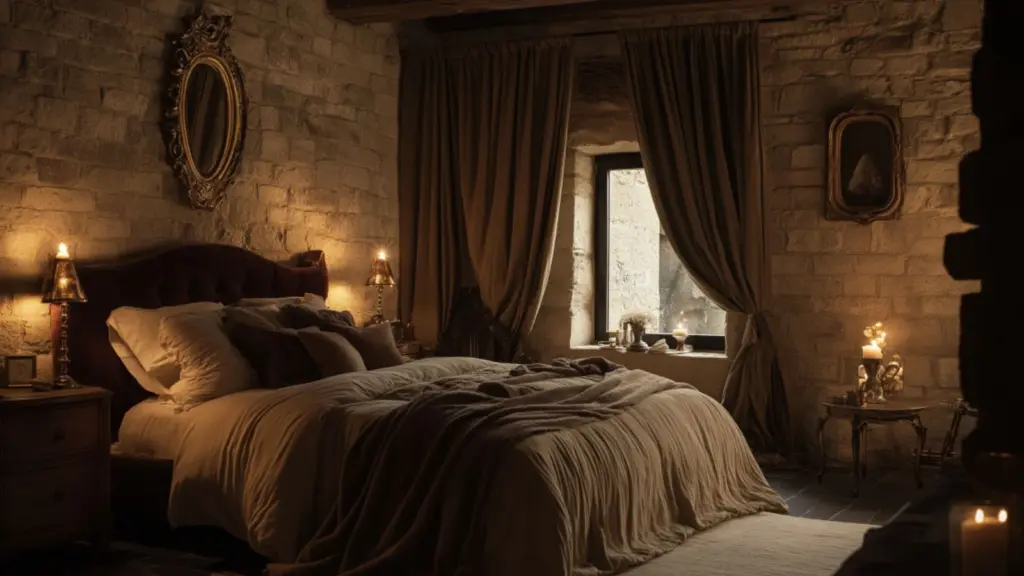
In a space dominated by darker hues, lighting becomes an essential player—and texture is its closest ally. Velvet absorbs light, while satin shimmers under candlelight. Rough woods cast subtle shadows. These interactions create a room that shifts with time of day and mood.
Ambient lighting—think table lamps with pleated shades, sconces, and candles—brings textures to life. Daylight can highlight grain in wood or folds in fabric, while night lighting enhances warmth and intimacy.
Strategically placing light sources helps emphasize layers. A soft spotlight on a textured wall tapestry, or a flickering candle on a lace-covered table, draws attention to the richness in materials.
Lighting Strategies to Highlight Texture
| Texture Type | Best Light Source | Visual Effect |
|---|---|---|
| Velvet curtains | Low-angle table lamp | Depth and shadow |
| Embroidered fabrics | Candlelight or string lights | Gentle detail illumination |
| Brick or stone walls | Directional uplighting | Dramatic texture emphasis |
| Glass or crystal | Sunlight or pendant light | Reflective sparkle |
How to Layer Soft Furnishings for a Luxe Cottagecore Look
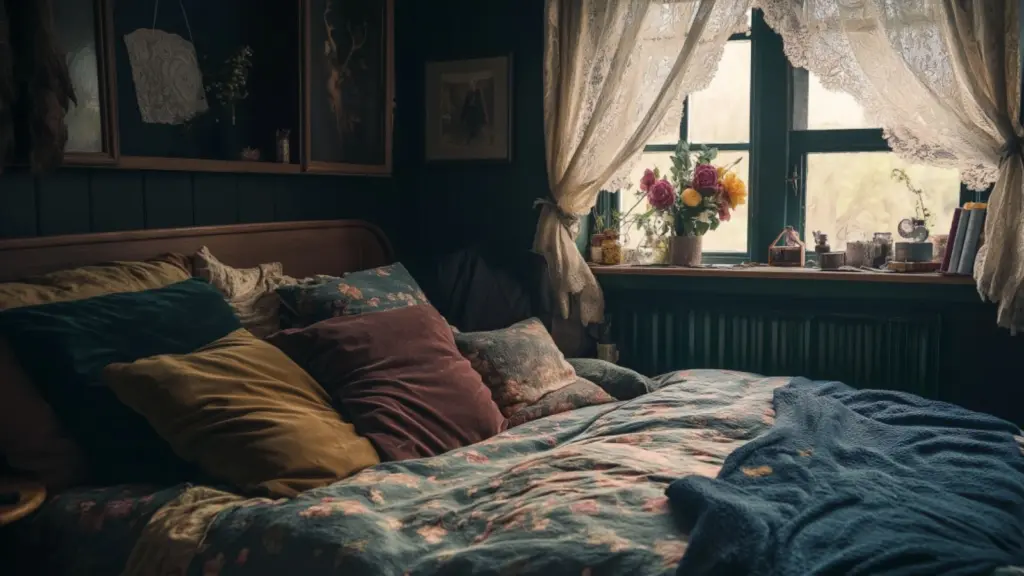
Soft furnishings—blankets, curtains, cushions, upholstery—are your best tools for adding depth and coziness to a dark cottagecore space. These elements can be easily swapped, layered, and customized to create a deeply personal and luxurious interior.
Start with your base: choose a sofa or bed in a richly textured material like velvet, tweed, or chenille. Then add dimension with contrasting elements. Drape a crocheted or hand-knit throw over the arm. Add pillows in varying shapes, sizes, and patterns—like damask, floral, or toile prints.
Curtains are another powerful tool. Floor-length, heavy fabrics like velvet or linen in dark tones help insulate and visually anchor the room. Layer sheers beneath to soften the effect and diffuse natural light beautifully.
For bedding, think in layers: crisp sheets, a patterned quilt, and a chunky wool blanket. Mixing solids with subtle prints adds richness without overwhelming the eye.
Layering Combinations for Soft Furnishings
| Base Layer | Mid Layer | Top Accent |
|---|---|---|
| Linen duvet | Floral quilt | Crocheted throw |
| Velvet sofa | Striped or tasseled cushions | Knitted blanket |
| Woven rug | Sheepskin rug overlay | Decorative floor cushion |
| Linen curtain | Lace inner panel | Tassel or pom-pom tiebacks |
This approach not only enhances comfort but adds narrative. Each fabric feels like a collected piece of history, contributing to the moody charm of the space.
Combining Pattern and Texture Without Overwhelming the Space
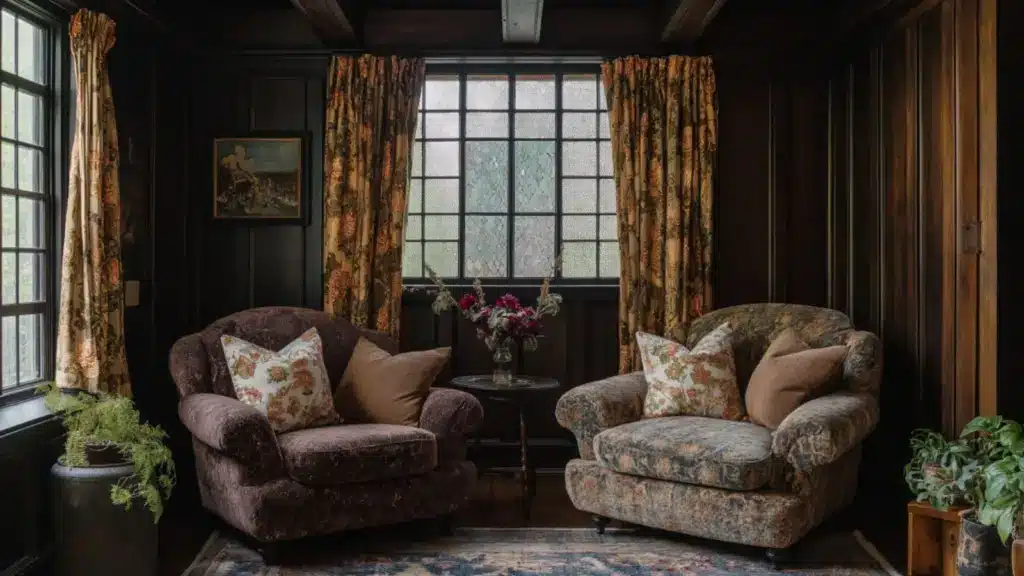
One challenge in designing a richly textured dark cottagecore interior is keeping it from feeling too chaotic. The solution lies in balance—using patterns and textures with intention.
Begin with a color palette of 3–4 muted or deep tones: think forest green, aubergine, rust, and ivory. This keeps the eye grounded even as you layer visual elements. Then choose a few anchor textures (like distressed wood and velvet), and add patterned elements sparingly to highlight focal points.
Patterns in dark cottagecore often lean vintage: toile, damask, ditsy florals, tartan. Use them in strategic areas—like accent pillows, framed fabric panels, or an upholstered chair. Let solids and rich textures carry the rest of the room.
Avoid using too many patterns that compete. Instead, look for variation in scale. Pair a small-scale floral with a bold stripe or a subtle plaid. Keep textures natural and patterns nostalgic to stay within the cottagecore theme.
Pattern & Texture Balance Blueprint
| Room Element | Texture Focus | Pattern Strategy |
|---|---|---|
| Accent wall | Plaster or wood panel | None or subtle stenciling |
| Sofa cushions | Velvet or wool | Mix two patterns max (e.g., floral + stripe) |
| Curtains | Linen or muslin | Solid with lace trim or embroidery |
| Area rug | Woven or tufted wool | Vintage-style floral or Persian |
This method creates a layered, rich aesthetic that feels cohesive and calm—even with so much visual interest.
Accentuating With Moody Botanicals and Natural Finds
Nature is a core part of cottagecore, and in its dark variant, it takes on an atmospheric, moody tone. Think dried eucalyptus, deep red roses, dark greenery, and pressed botanical art. These natural textures bring softness and life into a rich, brooding space.
Dried flowers in vintage vases or antique pitchers make easy centerpieces. Botanical prints in carved wooden frames add layered interest to walls. A collection of found feathers, pinecones, or stones arranged on a tray can echo natural shapes and add organic texture.
Mix fresh and dried plants for variety. Use dark leafy greens like rubber plant or philodendron to echo the richness of the decor.
Ideas for Botanical Accents in Dark Cottagecore
| Botanical Element | Display Method | Texture Added |
|---|---|---|
| Dried lavender | Bundled with twine, hung from hooks | Rustic aroma and softness |
| Pressed fern artwork | Framed in vintage glass | Flat, elegant detail |
| Eucalyptus branches | In ceramic or iron vases | Silvery texture, structure |
| Antique floral oil paintings | Leaning on mantels | Painted texture, nostalgic charm |
Adding Finishing Touches with Found and Handcrafted Items
The final layer in a richly textured space lies in the details. Handmade or found items add soul—embroidered table runners, carved bowls, hand-thrown mugs, or woven baskets.
These pieces break the uniformity of store-bought decor and bring individuality to your space. You might include an antique mirror with a mottled finish, a vintage quilt, or a handcrafted wall hanging. Each item contributes to the tactile narrative of the room.
Place these objects with care. Avoid clutter by using trays or layered stacks (books + bowl + candle). Let surfaces breathe while still feeling intentionally styled.
Curated Cottagecore Touches
| Item Type | Ideal Placement | Texture Effect |
|---|---|---|
| Hand-thrown ceramics | Coffee table or open shelf | Earthy, tactile contrast |
| Woven trays or baskets | On entry table or wall hook | Organic structure |
| Lace doilies | Layered on wood surfaces | Vintage delicacy |
| Antique mirrors | Above fireplace or dresser | Reflective aging charm |
Conclusion
Layering textures in dark cottagecore decor is more than a design technique—it’s a way to create emotion through space. Each choice, from velvet upholstery to a single sprig of dried lavender, adds depth and resonance. By balancing rough and smooth, light and shadow, and old with new, you craft a room that feels rich, storied, and truly yours.
As you explore your own interpretation of this style, remember that the goal isn’t perfection. It’s personality. Let your textures speak of comfort, creativity, and timeless beauty.
